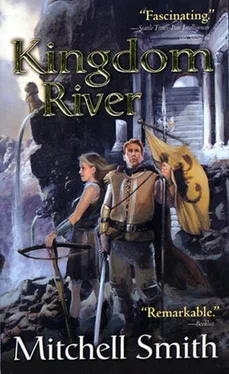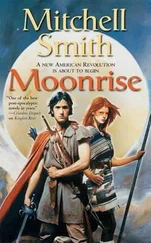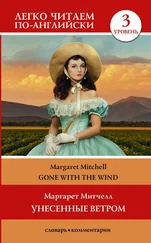And why was that news so welcome? So good to hear? Why seemed so rich with opportunity? The answer came like certain music as Sam began to drift to sleep… came as dreamed trumpet calls, sounding, Duty, duty, duty. What trumpet call did not?
…Had he taken his damn boots off? Couldn't remember.
Martha had washed herself, and her hair – drawn it up into a loose knot and pinned it, then combed and finger-curled a long ringlet in front of each ear. Charlotte Garfield had told her that her long hair, dark as planting ground, was her best feature. "Only feature," Charlotte's sister had said, and had neighed in fun at Martha's size.
Though clean, her hair done, Martha was scrubbing homespun small-clothes – just discovered dirty beneath her father's bed – in the tub on the dog-trot, when she glimpsed metal shining through the trees. She took her hands off the rippled board, shook hot water and lye suds from her fingers, and watched that shining become soldiers marching up along the River Road.
There was a short double-file of men, East-bank soldiers armored throat to belly with green-enameled strips of steel across their chests… lighter steel strips down their thighs, sewn to the front of thick leather trousers. An officer was marching in front, and so must be a lieutenant. Lieutenants marched with their men, and never rode.
Martha watched them through the trees – her wet, reddened hands chilled by the early-winter air. Many soldiers traveled the River Road, now, because of fighting in Map-Missouri… Though that was the West-bank army, fighting over there. She'd heard that army wore blue steel.
As Martha watched, the lieutenant and his men reached the cabin path – then turned neatly and marched up it. They were coming to her father's house, something soldiers had never done before. These were crossbowmen – heavy windlass bows and quarrel bundles strapped to their packs, short-swords and daggers at their belts. Long, green-dyed woolen cloaks, rolled tight, were carried over their left shoulders.
"Daddy!" She thought surely William Bovey had died after all, and they were coming to take her to hang.
Her father came to the door, said, "What is it?" Then saw what it was.
More than three Warm-time weeks before, Big William Bovey and two other large men had come out to the cabin, angry over a deal for a four-horse wagon team, and begun to beat Edward Jackson with sticks and their fists. It had seemed to Martha they were killing her father.
She'd run into the farry shed, taken up a medium hammer, and come out and brained William Bovey. Then she'd beaten his friends so bones were broken, and they'd run.
Bovey, a corner of his brain tucked back in, had been asleep ever since at his aunt's house up in Stoneville. It was the opinion of Randall-doctor that he would never wake up.
"No death done," the magistrate had said, "and some excuse for the fighting on both sides, since Edward Jackson is a horse-dealer and cheat. Yet his daughter, only seventeen, had reason to fear for his life." The magistrate, who chewed birch gum, had spit a wad of it into a brown clay jar on his table. "All parties are now ordered to both peace and quiet under the Queen's Law. Nothing will save any who break either."
And that had been that. Until now.
"Run!" her father said – too late, as the old man was usually too late.
Martha stood waiting, drying her hands on her apron, and wished for her mother.
… The lieutenant was young, but not handsome, a freckled carrot-top in green-steel strap armor. His face was shaved clean, like all soldiers'. He swung up the path to the door-yard, and his men marched behind him – twelve of them and all in step, their steel and leather creaking, till he put up his left hand to halt them.
"Well – " Though slender, the lieutenant had a deep voice. "Well, Honey-sweet, you're certainly big enough." His breath steamed slightly in the morning air. "You are Ordinary Mattie Jackson?"
"What do you want here?" Martha wished her father would say something.
The lieutenant smiled, and looked handsomer when he did. He had one dot tattooed on his left cheek, two on his right. "It's not what I want… not what the captain wants… not what the major wants… not even what the colonel wants."
A big man behind the lieutenant – a sergeant, he seemed to be – was smiling in a friendly way. The sergeant was bigger than Martha, as a man should be.
"No," the lieutenant said, "it appears to be a matter of what Island wants. And Island's wishes are our commands."
"You leave us alone."
The lieutenant shook his head, still smiling.
Martha's father said nothing. Edward Jackson was worse than having no father at all.
"Get what things you can carry," the lieutenant said, not in an unpleasant way. "You're coming with us."
"Is William Bovey dead?"
"I don't know any William Bovey, though I wish him well. I do know that you are ordered to come with us. So, get your whatevers; put your shoes on – if you have shoes – and do it fairly quickly."
"No," Martha said, and couldn't imagine why she'd said it. The big sergeant, standing behind his lieutenant, frowned at her and shook his head.
"Ralph, be still," the lieutenant said, though he couldn't have seen what his sergeant was doing. "Now, Mattie – it is Mattie?"
"Martha."
"Martha. Right. Now listen, even though it may cost my men some injuries" – his soldiers smiled – "I will have you subdued, bound, and carried with us as baggage, if necessary. Don't make it necessary."
"But… why?"
"Orders."
Her father still said nothing, just stood in the doorway silent as a stick. Suddenly, Martha felt she wished to go with the soldiers. It was a strange feeling, as if she'd eaten something spoiled.
She turned to Edward Jackson and said, "You're not my father, anymore." Then she went into the cabin to get her best linen dress, her sheepskin cloak, her private possibles (a bone comb, clean underdrawers and stockings folded in a leather sack), and her shoes – one patched at the toe, but good worked leather that laced up over her ankles.
…They walked south – the soldiers marched, she walked – through the rest of the day. Martha had started out beside the lieutenant, possibles sack on her hip, her cloak, like theirs, rolled and tied over her shoulder – but he'd gestured her behind him with his thumb, so she'd stepped back to walk beside the sergeant, Ralph, the one who'd frowned and shook his head at her. He was even taller than she was, and wider.
It had always seemed to Martha, when she'd seen them in parade at Stoneville, that soldiers marched slowly. But now, going with them, she found they moved along in a surprising way. It was a steady never-stopping going, nothing like a stroll or amble, that ate up time and Warm-time miles until her legs ached and she began to stumble.
Ralph-sergeant took her left arm, then, to steady her. He smelled of sweat, and of leather and oiled steel.
They camped at dark, but lit no fire, though frost had filtered down. The soldiers drank from tarred-wood canteens – the sergeant let her drink from his – and chewed dry strips of meat.
He gave her some of that as well… Then the soldiers went into the woods to shit, came out, and lay down in dead grass in their long woolen cloaks as if they were under a roof and behind house walls – the lieutenant, too. Only one man was left standing under the trees, watching, with a quarrel in his crossbow as if this was enemy country.
The sergeant had stood guard, yards away and his back turned, while Martha did her necessary behind a tree. Then he'd cut evergreen branches for her to lie on… She supposed her ringlets had straightened some from walking and sweating, so she had no good feature, now.
Читать дальше












